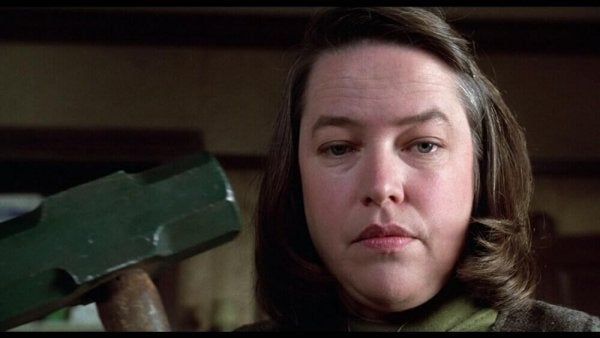We’ve said it a million times on this site. One of the best ways to get noticed as a writer is to create a great character. It’s such a powerful trick, in fact, you don’t even need the rest of the script to be that good.
The funny thing about this is that we all know what a great character is after we’ve watched one — Arthur Fleck, Forrest Gump, Louis Bloom (Nightcrawler), Mildred Hayes (Three Billboards), Tiffany Maxwell (Silver Linings Playbook), Annie Wilkes — yet when we’re staring at the blank page and we ask ourselves the question, “How do I write a great character?” we all of a sudden have no idea.
In fact, one of the most common issues I run across as a reader is plain characters. Specifically, plain MAIN CHARACTERS. There are a few of reasons for this but the most common is that we’re afraid if our main character is too complicated that he won’t be able to ground the story. So we give him a little quirk (he’s afraid to open up to the world!) and convince ourselves we’ve created someone juicy. In reality, he’s one more forgettable movie character with a generic flaw.
Before we dive too deep into this, let’s cover the basics. You find character through conflict. And there are three main forms of conflict when it comes to character creation. One is inner conflict. There’s a battle going on inside your character. Rick Dalton in Once Upon a Time In Hollywood spends the entire movie battling with whether he’s a good enough actor to keep trying to be a movie star or if he should settle and accept being second-tier villains in bad TV shows.
The second is inter-personal conflict. This is the conflict your character will have with others. You want to create relationships in your story that challenge your characters because challenged characters are forced to react. And that’s where you find the interesting stuff. In Misery, if Paul Sheldon lays over for everything Annie Wilkes wants, Annie can never clash with him. So Paul is always looking for ways to escape, pushing his luck, trying to trick her. This creates that interpersonal conflict that brings out the crazy in Annie. And, of course, the crazy is what makes that character so memorable.
Finally, there’s external conflict. This is the conflict your character has with the outside world. An easy way to test a character is to have the world you’ve created throw something at him. It could be a deadly storm just minutes after he’s survived a plane crash. It could be a horde of zombies standing between him and the only exit in the building.
You don’t need all three of these to create a great character, but you usually need two of them. And the first two are where you’re going to get the most bang for your buck. Something your hero is battling internally and a few unresolved conflicts with the main characters surrounding him. If you execute this well, at the very least you’ll have a solid character. Although, you probably won’t have a juicy one.
Another staple of good characters is that they’re active. The reason active characters yield better results than passive ones is because when somebody is being active, they’re routinely running up against problems in the world. If they stay home and don’t do anything, though, there isn’t a whole lot you can throw at them.
It would’ve been so easy to make Arthur Fleck (Joker) a passive reclusive character. That definitely fits his persona. But I’m guessing the writers realized that if they did that, it would be hard to put Arthur into enough interesting situations. So they made him active in two ways. One, he needed that clown job to pay the rent. And two, he was an aspiring comedian. You’ll notice that the comedian plot line is what dictated everything that happened in the plot. That’s how important active characters are in movies.
Still, these are just the basics. They only get you so far. How do you find the special sauce that elevates a character into something extraordinary?
The bite-size answer to this question is to think of the actor who will be playing the part. When an actor reads the script, they don’t read it like you or I do. They read it from the perspective of, “Is this a meaty role? Is this someone I could do something with?” They want something that’s going to blow people away.
Think about it. Let’s say you’re an actress and you received the scripts for “Yesterday” and “Marriage Story.” In Yesterday, you’d be playing Jack Malik’s manager/love interest, a down home girl who isn’t interested in all the glitz and glamour of the rock star life. In Marriage Story, you’d be playing the cutthroat heartless divorce lawyer for Nicole, who’s more interested in “winning” than she is serving the best interest of her client. Which role would you want to play?
Unfortunately, the “actor hack” doesn’t give us any technical direction. Still, it’s a quick way to see if the character you’ve written is interesting at all. If you can’t imagine actors climbing over each other to play the part, it’s probably not that compelling of a part.
Another “quick-fix” tip on creating juicy characters is to build HEAVY CONTRAST into them. If you think of your character as a spectrum, you want to play with both ends of that spectrum. If you only play with the middle keys, the character is going to be pretty boring.
Annie Wilkes is the jolliest woman in the world in one scene, then she’s the angriest woman in the world in the next. Or a character who has terminal cancer but is always happy. Or a Nazi skinhead who’s at the forefront of stopping child trafficking. A cheerleader who’s diagnosed with depression. It’s an admittedly cheap way to create depth but it works! So if you’re trying to write something fast, this may be the way to go.
Now let’s get into the deeper stuff.
One of the big ones is THE HAND YOUR CHARACTER HAS BEEN DEALT. A lot of the most interesting people in this world are people who were dealt a bad hand. Naturally, these characters stick out in movies. Forrest Gump was dealt a bad hand. Arthur Fleck was dealt a bad hand. Stephen Hawking was dealt a bad hand. The reason these characters play so well on screen is because they have to deal with much higher levels of adversity than the average person. And we like to see people overcome adversity. The bigger the wall they have to climb, the more we root for them. If you look at all the Oscar winning roles, you’ll see a lot of characters who were dealt a bad hand.
Backstory is another biggie. If you can get backstory right, it will be the most effective way of creating a deep interesting character. The reason you don’t see it utilized well often is because it takes a lot of work to explore backstory and since a lot of that isn’t on-the-page writing, writers don’t want to do it. But most people are in deep conflict with their past – either who they used to be or a specific event that changed their life. So if you can find something meaningful in your character’s past that shapes who they are today and package it in a manner where the true journey of your story is them resolving this issue? Those tend to be the characters that stay with people the longest.
Mildred Hayes (Three Billboards) is an angry vindictive woman who hates almost everyone. But we know why. Her daughter was brutally raped and murdered and nobody is doing anything about it. That event is the main source of conflict dictating this character’s actions. She clearly needs to resolve this issue if she’s ever going to be “normal” again.
And it doesn’t have to be heavy like that. Cliff Booth (Brad Pitt in Once Upon a Time) is a feel-good happy-go-lucky guy. Taken at face value, his character is almost forgettable. But Cliff has a major event in his past dictating who he is today. His wife either accidentally drowned or he killed her. That extra detail from the past makes that character so much more interesting. Because if he killed her, that means he has to live a lie the rest of his life. If she died accidentally, he lost his wife.
Which brings me to another powerful concept when it comes to character creation – deceit. This kind of falls into the “contrast” category. But we’ll deal with it on its own since it’s utilized so often. Deceit is a character who is built on a lie. They’re presenting themselves to the world one way, when in reality they’re someone completely different. Patrick Bateman in American Psycho. Walter White in Breaking Bad. The entire family from Parasite. It’s not surprising that these characters pop off the page so easily. Whenever you’re pretending to be someone you’re not, you’re creating a duality that naturally translates into depth.
Finally, I want to talk about addictions because there are a lot of juicy characters who are built around addictions, mostly drugs and alcohol. It’s true. These characters can be memorable. But ONLY if you make a key adjustment. It can’t be about the addiction itself. It has to be about WHAT CAUSED THE ADDICTION. So if someone’s an alcoholic, that’s an empty shell to an audience member. But if they started drinking due to the death of someone close to them, now the addiction is LINKED to something. And once you have something to link to, you have an actionable journey for your character. They’re not trying to kick alcoholism. They’re trying to move past that death.
Let me finish off by saying that it’s really hard to make PASSIVE or QUIET characters work. If you mix those two things into a single character, it’s virtually impossible to make them interesting. And even individually they’re hard to make work. Finally, there is no equation out there that says, if you mix all of these elements together in “this way,” you’ll create a great character. But if you think of them as musical notes, everything discussed today are the notes you want to play with. Some combination of them is going to give you your juicy memorable character. Good luck!
Carson does feature screenplay consultations, TV Pilot Consultations, and logline consultations. Logline consultations go for $25 a piece or $40 for unlimited tweaking. You get a 1-10 rating, a 200-word evaluation, and a rewrite of the logline. They’re extremely popular so if you haven’t tried one out yet, I encourage you to give it a shot. If you’re interested in any consultation package, e-mail Carsonreeves1@gmail.com with the subject line: CONSULTATION. Don’t start writing a script or sending a script out blind. Let Scriptshadow help you get it in shape first!





